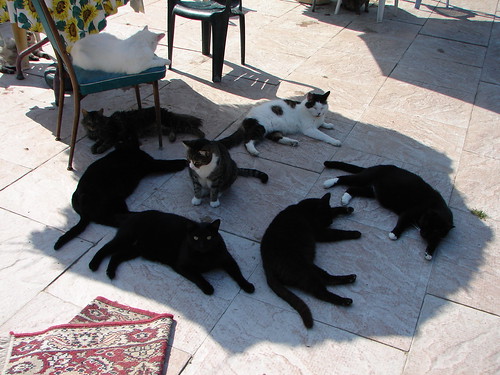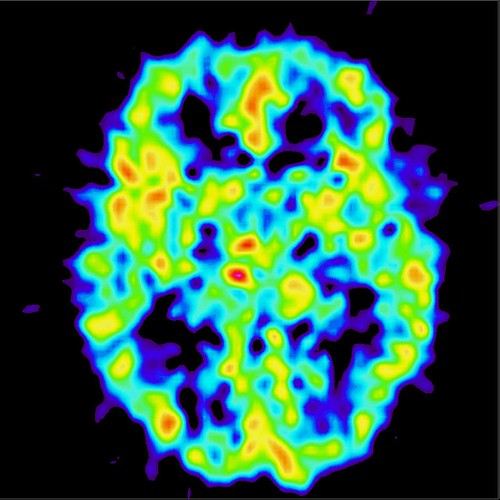Our first Grand Rounds in 2007 featured a clicky brain, and the second featured the then-new iPhone 3G, complete with clicky iPhone apps. This time, we've used clicky pictures that exemplify the "hot" theme. (We didn't want to ignore the southern hemisphere, so if submitters live where June 21 kicks off the winter solstice, we asked that they feel free to use a "cold" theme and picture.) I had planned to make a grid of all the pictures at the top of the post, by the way, but I've run out of steam.
We received21 24 submissions this time: 11 via Twitter, 9 12 via email, and 4 via Facebook (3 were duplicates). [edit: I inadvertently left out three posts... find them at the end]
We received
Walter Jessen from Highlight Health submitted the HOTTEST post for this theme: Surviving Summer: The Good, the Bad, and the Ugly.
The signs of heat exhaustion often begin suddenly. Symptoms resemble those of shock and may include feeling faint or dizzy; nausea or vomiting; heavy sweating; paleness; muscle cramps; weakness or tiredness; and headache. The skin may be cool and moist. The pulse rate will be fast and weak, and breathing will be fast and shallow. Untreated, heat may progress to heat stroke.
In addition to the new labeling, the FDA has proposed to limit the maximum SPF value on sunscreen labels to "50+", because there isn't enough evidence to show that products with higher values provide any more protection. FDA is now seeking public input on that. The FDA is also reexamining the safety information available for active ingredients included in sunscreens marketed today.
In A Medical Resident's Journey, Another Day, Another Summer... reflects on the different sorts of summer maladies appearing in the summer Emergency Department.
Heat rises from the sidewalks of the city. Backyard grills appear again. Sun dresses, outside tables, kites, picnic baskets, bike riding. The world welcomes us to summer. In the hospital, it is a time of great change. All of us – residents, fellows, medical students – are moving on in our journey. Over a period of a few weeks, we will be “promoted” to new positions in the hospital. Some of us – those who have completed their training – will be leaving, to become attending physicians at last.
Dr Nicholas Fogelson from Academic OB-GYN sent in One for the Medical Students -- on Presenting, explaining how med students can give HOT patient presentations. Okay, that was a big stretch, as we couldn't determine any link here to the summer solstice nor summer pictures. Wait, I've got it... at the end of each patient discussion, one should provide a very Summery presentation!
A student that never jettisons the note cards will never be an effective presenter.
David Williams from Health Business Blog gave us some HOT hospital clowns in action in Hospital Clowning: Video Introduction to Hearts & Noses Hospital Clown Troupe.
The clown aspect people think they get, but it’s hard to explain how empowering the professionally trained, dedicated volunteers are to the thousands of children and families they serve.
Brooke Douglas from DrPullen decided to inflame us with Inflammation and Diet: Inflammatory and Anti-Inflammatory Foods.
Hot stuff!
The problem occurs when chronic inflammation occurs inside our body and we can’t see it or feel it. This chronic inflammation does not allow for natural repair and healing caused by the damaging ‘pro-inflammatory’ (saturated and trans) fats.
Bob Vineyard from Insure Blog sent in Georgia Piedmont Hospital Layoffs. In a move that's sure to leave docs and patients hot under the collar, an Atlanta hospital is laying off over 400 health care workers.
Georgia, looking for new revenue, decided the prudent thing was to implement a hospital bed tax. As with any other tax imposed on business, the customers (patients) pay the tax. The irony is, the bed tax was introduced to make up for current budget problems in funding Medicaid. It makes you wonder what will happen when Obamacrap expands the Medicaid rolls in 2014.

Zoe Brain sent in a post from Box Turtle Bulletin, which features "news, analysis and fact-checking of anti-gay rhetoric." She describes the post, What Are Little Boys Made Of?, written by editor, Jim Burroway, as HOT as in timely, radioactive, controversial. It is a stirring description of past "treatments" for homosexuality during a period when even having effeminate traits was considered a sign of disease. The long-term consequences to Kirk "Kraig" Murphy, a 5-year old in 1970 and the subject of a series of research papers, are chronicled here.
In this original BTB investigation, we speak with [Kirk's] family and friend who knew the real “Kraig” to uncover the truth behind [researcher] Reker’s greatest success story. Their stories reveals the tragedy of a terrible experiment on a very young boy which would haunt him for the rest of his life. It is not only an indictment of a man who built his anti-gay career on Kirk’s suffering, but a rebuke to others — those in the mental health profession then and in the contemporary ex-gay movement today — who would place their careers and agendas ahead of the well-being of this young boy and countless others like him.
Louise Norris from Colorado Health Insurance Insider sent in her HOT topic: Rate Review Process Does Not Keep Insurance Premiums Artificially Low. Last year or so, framing the whole health care reform discussion, a large California insurer announced 39% rate hikes. This post discusses a California bill that would require rate regulation by the state's insurance commissioner, which many states currently have, and a research article finding that rate regulation does not put insurers out of business.
Having rates approved by the DOI does not mean that the people of Colorado get smaller-than-average premium increases. Rather, it means that although our rate increases are sometimes substantial, we know that those rates are justified as a reflection of increasing claims costs.
South African surgeon, Bongi, blogs on Other Things Amanzi. He sent in Dolls Eyes, about his experience as a fourth-year medical student helping a woman with a tragic fetal loss.
i remember sitting there in that small labour room where mothers are usually introduced to their new babies while the registrar ran the sonar probe over the mother's swollen abdomen. i remember her bringing the probe to a standstill over the heart. we could clearly see the heart, but there was no movement. the heart was not beating. as we actually already knew, the baby was dead. all that remained was to tell the mother.
Erin Breedlove, who has cerebral palsy, submitted a post from her blog, Healthy, Unwealthy, and Becoming Wise, about what to say to children when they ask her, What's Wrong With You?
To me, it’s a pretty poignant, honest question because there are some days that I’m not sure how I’d answer it to anyone, much less myself. As a future educational psychologist, I’m a fierce advocate for giving children all the information. No, they might not be able to understand the full extent of what you mean at their current age and stage of development, but trust me, they’ll appreciate it later... One of the most common questions I’m asked is about why I don’t use the “everybody’s different” response, and there are two reasons in addition to the ones outlined above. The first is that I believe that the response undermines the intelligence of a child, and that’s the last thing anyone wants to do during critical stages of development, and the second is that I believe that the only way children will learn and understand is to be inquisitive, so I appreciate that with everything in me.
Jacqueline from Laika's MedLibLog gives us the low-down on the question of Does Soy Relieve HOT Flashes?
The other phytoestrogen interventions were very heterogeneous with respect to dose, composition and type. This was especially true for the dietary soy treatment. Although some of the trials showed a positive effect of phytoestrogens on hot flashes and night sweats, overall, phytoestrogens were no better than the comparisons. Most trials were small, of short duration and/or of poor quality... One striking finding was that there was a strong placebo effect in most trials with a reduction in frequency of hot flashes ranging from 1% to 59%.
The med student at Metropolis Med posted on Action Potential about 5 Memorable Moments as a first-year medical student where she lost her cool (losing cool = HOT!).
2. That time the med school dorm decided to test every smoke alarm.
3. That time we were assigned 250 pages of reading in one day.
Sarebear posted on Across and Inside My Universe about those times When the Doctor/Patient Relationship Becomes Heated.
Before I get into specifics, let me say that as a patient, when you are sitting there on the receiving end of some "heat", or ire, or intense aggravation, or anger, even, it is shocking, bewildering, and causes you to wonder what is wrong with you or what you did wrong, as the patient, to deserve what is happening. You are shocked because, if you've had enough dealings with this doctor (about a year, in my first healthy's case, when this happened) you know that he normally conducts himself much more professionally; to see and FEEL such unfettered, intense, unpleasant emotion, directed at YOU . . . well to say it is bothersome is an understatement.
Rachael Watman from the John A Hartford Foundation blog wrote about the HOT topic of Helping Hoarders, profiling the work of Monika Eckfield RN PhD.
I interviewed 22 adults age 65 and older, six men and 16 women. My oldest participant was 91. Most of them lived alone. Most had hoarding behaviors to varying degrees all their lives. When you’re living with someone there tend to be checks and balances, and the home doesn’t get overwhelmingly cluttered. When a person gets divorced or becomes widowed they no longer have the checks and balances. Other life changes can also exacerbate hoarding behavior...
Julie Rosen of Bedside Manner, from the Schwartz Center for Compassionate Healthcare, wrote about the passion behind Massachusetts First Lady Diane Patrick and her experience of Compassion for the Mentally Ill. [submitted by Petra Langer]
Today, Mrs. Patrick’s advice to those suffering from depression is to seek help and to be open to compassion. “Because I admitted my problem, I allowed compassion to come to me,” she says. “Not only did I receive compassionate care from my wonderful therapist, I was treated with compassion by those around me – and the abundance of compassion I received helped me to recover.”
Kimberly Grady wrote Life at Grady: Stop, Look, Listen, posted on ACP Hospitalist. The patient presents with a fever and leg pain after a bad pedicure.
I immediately covered my mouth, forgetting that I was in earshot of my attending. Then I said it again as I skimmed the abstract of that article. The second time, I didn't even bother covering my mouth. This "damn" wasn't a "Damn, I should've known that!" It was a "Damn, this dude knew what was wrong with this patient just from the bedside." Or better yet "Damn, when I grow up, I'm TOTALLY going to roll up on a patient's bedside and nail a diagnosis just like that."
Ramona Bates from Suture for a Living tweeted her submission about The Impact of Obesity on Breast Surgery Complications, which she swears is a HOT topic in her field.
Overall, 18.3% of obese patients had a complication compared to only 2.2% in the control group (p<0.001). After adjusting for other variables, the researchers found obesity status increased the odds of experiencing a complication by 11.8 times.
Elaine Schattner from Medical Lessons emailed a related HOT topic from Wired, Human Milk for Sale, Where's the FDA?
As much as I think it’s a good idea for women to breast feed their babies as best they can, I was pretty shocked to learn about this unregulated industry. Mainly because if a woman who donates milk is infected with a virus, like HIV or HTLV-1, the milk often contains the virus. The infant can absorb the virus and become infected. Feeding human breast milk from an unknown donor is kind of like giving a child a blood transfusion from a stranger, unchecked by any blood bank.
Glenn Laffel from Pizaazz emailed The Effectiveness of Online Health Intervention Programs, talking about the HOT new trend of medical apps, particularly the online videogame, Re-Mission.
Re-Mission is intended improve medication compliance in teens and young adults with a history of cancer. In the game, players control a nanobot within a 3-dimensional body of a young person that has cancer. Play involves destroying cancer cells and managing chemotherapy-related adverse effects like vomiting and bacterial infections by using antiemetics and antibiotics. The game purports to help users understand their disease and its treatment and improve their sense of self-efficacy: they can take control of their disease.
And the
I was impressed. This is what every pharmacy should be like – except, of course, for the dinginess, the creeping line and the fact that it was so crowded I could overhear these conversations. Maybe if we got federal legislation enacted requiring pharmacists to offer counseling with each prescription filled, this kind of attention would be the norm, adherence to medication regimens would improve and drug-related injuries would be reduced. Wait a minute. Someone already had that good idea.[these last three posts were accidentally left out of the initial draft... sorry guys]
The Happy Hospitalist was thinking about how to explain those unwritten Bathroom Etiquette and Rules for Public Restroom to his young son [get it?].
- Always leave at least one urinal between you and another person
- Do not look at others while urinating
- No touching
Beth Gainer in Calling the Shots is a little steamed about the unintended fall-out from a National Cancer Survivors Day.
Just when the marketing of cancer feel-good gimmicks cannot get more insulting, there's National Cancer Survivors Day. Oops, I forgot to include that pesky little registered symbol.
Romeo Vitelli in Providentia sent in a radioactively hot post on the history of radium in That Healthy Glow.
By 1917, the United States Radium Corporation had patented the first glow-in-the-dark radium-based paint (with the brand name of Undark). Between 1917 and 1926, the company employed hundreds of female workers to paint luminous watch dials under uncontrolled conditions. The workers (later known as the Radium girls) had been reassured that radium-based paint was harmless and no industrial safeguards were in place to limit contamination. ... the factory managers encouraged the workers to use their lips and tongues to wipe off the paint. Some of the workers even went to far as to use Undark to paint their fingernails as an odd fashion statement. By the time the toxic consequences of radium exposure became apparent, it was far too late for them.
 Okay, so that's the end of our Hot Grand Rounds. Do have a safe and healthy summer! Be sure to check out next week's Grand Rounds host, Colorado Health Insurance Insider.
Okay, so that's the end of our Hot Grand Rounds. Do have a safe and healthy summer! Be sure to check out next week's Grand Rounds host, Colorado Health Insurance Insider.=Steve Daviss MD, co-author of Shrink Rap: Three healthys Explain Their Work.
























Tidak ada komentar:
Posting Komentar